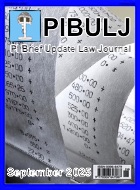April 2023 Contents
 Welcome to the April 2023 issue of PI Brief Update Law Journal. Click the relevant links below to read the articles. Welcome to the April 2023 issue of PI Brief Update Law Journal. Click the relevant links below to read the articles. CPD Note that there are no new monthly CPD quizzes since the SRA and the BSB have both updated their CPD schemes to eliminate this requirement. Reading PIBULJ articles can still help to meet your CPD needs. For further details see our CPD Information page.
|
|
| Personal Injury Articles | |
 Another reminder about the risks of surveillance footage: Mantey v Ministry of Defence [2023] EWHC 761 (KB) - Anisa Kassamali, Temple Garden Chambers Another reminder about the risks of surveillance footage: Mantey v Ministry of Defence [2023] EWHC 761 (KB) - Anisa Kassamali, Temple Garden Chambers Eyre J considered whether or not a former soldier had been fundamentally dishonest in his personal injury claim in light of surveillance footage. The claimant sought damages from the Ministry of Defence (The "MoD") for Non-Freezing Cold Injury ("NFCI") which he said he had suffered because of the MoD's negligence and/or breach of statutory duty. The claimant said that he was suffering sundry continuing disabling symptoms and his medical evidence provided details on this. However, the claim... |
 Inflexibility in Summary Assessment: R (Isah) v Secretary of State for the Home Department [2023] EWCA Civ 268 - Sebastian Bates, Temple Garden Chambers Inflexibility in Summary Assessment: R (Isah) v Secretary of State for the Home Department [2023] EWCA Civ 268 - Sebastian Bates, Temple Garden Chambers On this appeal, the Court of Appeal addressed 'whether a summary assessment must be undertaken by the judge making the order for summary assessment'. As Asplin LJ explained at [2] - [10], the appeal was brought by Mr Isah against a ruling on costs by Linden J. He had ordered that, if their quantum could not be agreed by Mr Isah and the Secretary of State for the Home Departments, then the costs that he had awarded would be summarily assessed by a Master. Asplin LJ's starting point was... |
 Non-Attendance on the Small Claims Track: Owen v Black Horse Ltd [2023] EWCA Civ 325 - Sebastian Bates, Temple Garden Chambers Non-Attendance on the Small Claims Track: Owen v Black Horse Ltd [2023] EWCA Civ 325 - Sebastian Bates, Temple Garden Chambers CPR 27.9 governs '[n]on-attendance of parties at a final hearing' on the small claims track. The question for the Court of Appeal in this case was what CPR 27.9 means by circumstances in which 'a claimant does not attend the hearing'. This question arose because Mr Owen was absent from the trial of his small claim, although his solicitor attended: see [5] - [18]. DDJ Sandcock struck out his claim under CPR 27.9(2) for reasons... |
 Embargoed judgments: InterDigital Technology Corporation & Ors v Lenovo Group Ltd & Ors [2023] EWCA Civ 57 - Anisa Kassamali, Temple Garden Chambers Embargoed judgments: InterDigital Technology Corporation & Ors v Lenovo Group Ltd & Ors [2023] EWCA Civ 57 - Anisa Kassamali, Temple Garden Chambers The fear of accidentally breaching an embargo on the disclosure of a draft judgment rests with all practitioners. Some comfort can be taken from the Court of Appeal's decision not to take matters further where such a breach had taken place but had not been deliberate: InterDigital Technology Corporation & Ors v Lenovo Group Ltd & Ors [2023] EWCA Civ 57... |
 Whiplash reform: As settlement times rise, the OIC portal remains far from perfect - Matthew Huggett, president of CILEX Whiplash reform: As settlement times rise, the OIC portal remains far from perfect - Matthew Huggett, president of CILEX In 2021, the Ministry of Justice brought in reforms that increased the small-claims limit for road traffic accidents from £1,000 to £5,000, implemented fixed damages for injuries that last up to two years and asked the insurance industry to set up an online claiming system - the Official Injury Claim Service (OIC). These changes were made amid considerable concern from across the legal profession about the potential for restricting access to justice for those making injury claims... |
|
| Clinical Negligence Medicine by Dr Mark Burgin | |
 What does the King's Bench Guide say to Litigants in Person? - Dr Mark Burgin What does the King's Bench Guide say to Litigants in Person? - Dr Mark Burgin Dr Mark Burgin explains what experts who are instructed by LiPs need to know about the advice from the King's Bench. The King's Bench Guide has been referred to in a recent case where a LiP was told that they should have read the relevant sections. Experts who wish to accept instructions from LiPs may need to explain this Guide. Helping LiPs follow the correct procedures is part of the expert's duty to the court under CPR1.1... |
 Privacy and dysfunction in a 1984 type World - Dr Mark Burgin Privacy and dysfunction in a 1984 type World - Dr Mark Burgin Dr. Mark Burgin BM BCh (oxon) MRCGP explains that little progress has been made to manage the dysfunction that is caused by denying individuals a private life. The social media giants have done more to restrict the public's ability to live their life in peace away from the constant gaze of others than any other actor. Governments have largely been complacent in responding to the threats posed by the loss of a private life focusing on data security rather than control of data... |











![Appeal judge rules that credit hire company has no costs liability following a finding of fundamental dishonesty in personal injury case: RSA v. Fastrack Solutions Limited [2023] 4 WLUK 92 - David Bowden, Erimus Chambers](/content/images/resized/images/stories/carkeys_72_72.jpg)


